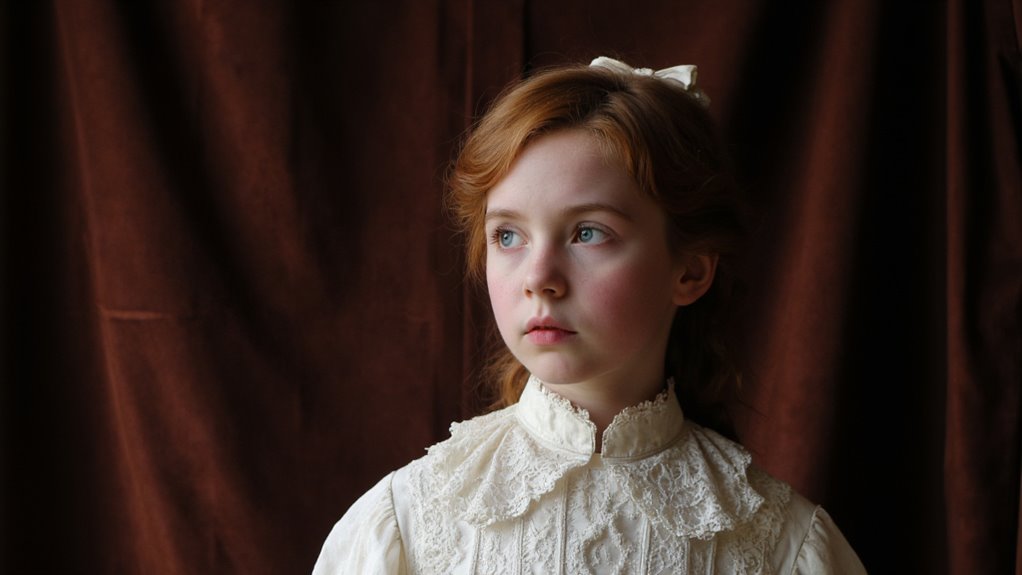61+ *Best* Victorian Girl Names (With Meanings)
Exploring Victorian girl names reveals a nuanced reflection of societal values and cultural ideals of the era. Each selection, from classical to nature-inspired options, encapsulates specific virtues such as virtue, resilience, or elegance.
Understanding the historical significance behind these names provides a richer context for their enduring appeal. As you examine this curated list, consider how these names embody the virtues and aspirations of Victorian society, prompting a deeper appreciation for their lasting influence.
Alice
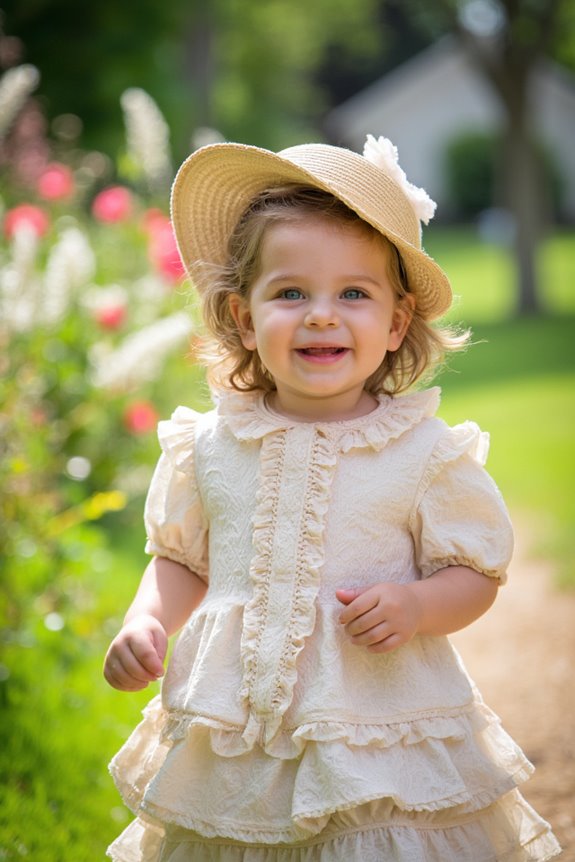
The name Alice, rooted in medieval Germanic origins, gained widespread popularity during the Victorian era due to its literary associations and cultural significance.
Its prominence surged through Lewis Carroll’s Alice’s Adventures in Wonderland, which cemented the name’s whimsical and intellectual connotations.
This literary link elevated Alice as a symbol of curiosity, imagination, and Victorian-era fascination with fantasy.
Alma
Alma, a name of Latin origin meaning “nourishing” or “kind,” gained popularity during the Victorian era through its association with spiritual and literary traditions.
Alma’s historical significance reflects its use in religious texts and notable figures, influencing popularity trends. Its enduring appeal signifies a cultural appreciation for nurturing qualities embedded within Victorian societal values.
Amelia
Amelia, a name of Latin origin meaning “work” or “industrious,” experienced a resurgence during the Victorian era, reflecting societal admiration for diligence and virtue.
Amelia’s historical significance lies in its association with prominent figures, while in modern culture, it endures as a symbol of resilience and elegance, maintaining its popularity across generations and cultural contexts.
Annabelle
Annabelle emerges as a name that embodies both Victorian sensibilities and evolving cultural nuances, reflecting society’s fascination with elegance and romance during the era.
Its popularity aligns with Victorian naming trends emphasizing floral and romantic qualities.
Particularly, Annabelle’s literary significance underscores its timeless appeal, illustrating how Victorian literature often celebrated names that conveyed grace, innocence, and poetic charm.
Arabella
While Arabella’s roots can be traced to the Latin name “Orabilis,” meaning “able to pray” or “invokable,” its adoption during the Victorian era reflects a broader cultural appreciation for lyrical elegance and aristocratic refinement.
Arabella’s historical significance lies in its association with nobility, and in modern culture, it endures as a symbol of timeless sophistication and literary allure.
Beatrice
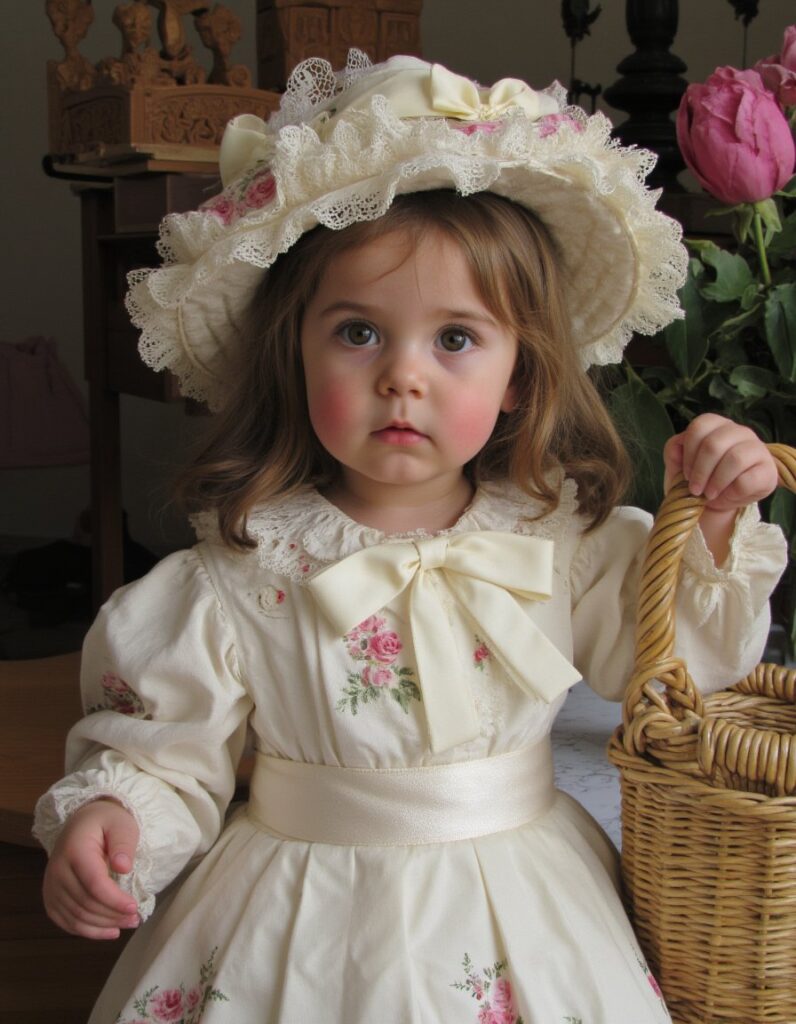
Building upon the Victorian fascination with names that evoke both elegance and literary resonance, Beatrice exemplifies these qualities through its rich historical and cultural associations.
Its literary significance is rooted in Dante’s “Divine Comedy, elevating its status in Victorian society as a symbol of virtue and intellect, reflecting the era’s appreciation for classical references and refined femininity.
Clara
Clara, a name rooted in simplicity and clarity, embodies the Victorian era’s admiration for genteel femininity and moral virtue.
Clara’s historical significance is evident in its association with influential figures and cultural ideals. Its literary connections, especially in Dickensworks, underscore its popularity and representation of moral integrity, making it a quintessential Victorian name.
Cora
Cora, a name imbued with both elegance and strength, reflects the Victorian era’s fascination with virtue and natural beauty.
Its literary significance is evident in its association with characters embodying resilience and moral integrity.
In Victorian fashion, Cora symbolizes grace and refinement, often representing the idealized virtues admired during the period’s emphasis on modesty and moral virtue.
Daisy
The name Daisy, with its delicate floral connotations, embodies the Victorian era’s appreciation for nature’s beauty and innocence.
Its symbolism in literature often represents purity and simplicity, reflecting societal ideals.
Understanding Daisy’s flower symbolism reveals its cultural significance, while its frequent appearance in Victorian literature underscores its association with youthful innocence and genuine virtue.
Edith
Building upon the Victorian era’s fascination with meaningful names rooted in virtue and tradition, Edith exemplifies qualities of dignity and intellectual strength.
Edith’s historical significance reflects its association with notable figures and its enduring cultural resonance.
In modern literature, Edith often symbolizes resilience and wisdom, highlighting its timeless appeal rooted in Victorian ideals of virtue and scholarly pursuits.
Eleanor
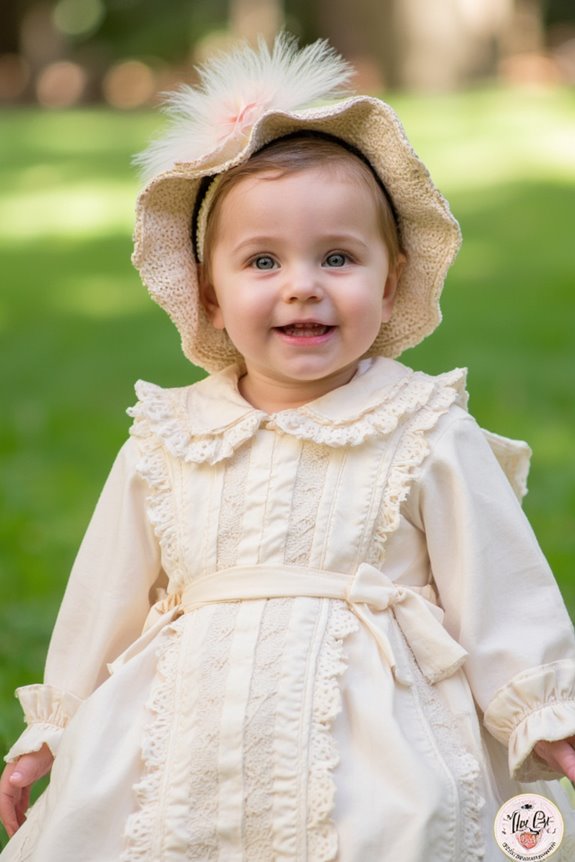
Eleanor embodies the Victorian era’s admiration for strength, virtue, and intellectual integrity, serving as a symbol of both nobility and moral resilience.
Eleanor Roosevelt’s influence exemplifies this, inspiring leadership and advocacy.
In literature, Eleanor often symbolizes intelligence and moral fortitude, reinforcing the name’s association with resilience and principled virtue within Victorian and modern contexts.
Elizabeth
Elizabeth, a name deeply rooted in Victorian ideals of dignity, sovereignty, and moral authority, exemplifies the era’s reverence for noble virtues and regal elegance.
Its association with Elizabethan Poetry and Elizabethan Fashion reflects a cultural admiration for literary refinement and ornate attire, emphasizing the name’s enduring symbolism of sophistication, intellectual achievement, and aristocratic grace during Victorian society.
Eloise
Eloise emerges as a name emblematic of Victorian sensibilities that valued both literary refinement and poetic elegance.
Its historical significance stems from its association with aristocratic and literary circles, enhancing its cultural weight.
In modern literature, Eloise endures as a symbol of sophistication, reflecting its timeless appeal and ongoing influence in contemporary storytelling and character development.
Elsie
Elsie, a diminutive form of Elizabeth, exemplifies Victorian-era preferences for affectionate yet refined female names that balance simplicity with charm.
Reflecting Victorian naming trends, Elsie gained literary significance through its appearances in contemporary works, embodying the era’s fondness for diminutives.
Its enduring appeal highlights Victorian society’s emphasis on modesty, warmth, and approachable elegance.
Florence
Florence stands out among Victorian girl names for its historical richness and cultural resonance, reflecting a period when classical and geographical influences heavily shaped naming choices.
Its association with Florence Nightingale’s legacy highlights themes of compassion and reform, while Florence’s prominence in art history underscores a legacy of creativity and intellectual achievement during the era.
Genevieve
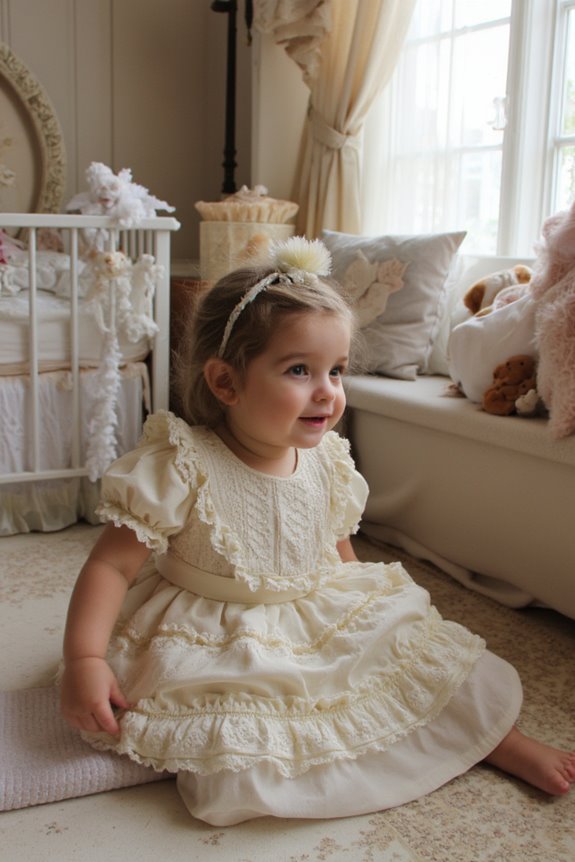
Genevieve, a name of French origin meaning “woman of the race” or “tribe woman,” exemplifies the Victorian era’s fascination with elegance, heritage, and romanticism.
Its historical significance lies in its association with medieval legends and aristocratic nobility, reflecting Victorian ideals.
The Genevieve name origin underscores a deep cultural reverence for lineage and ancestral connections during that period.
Georgiana
The name Georgiana embodies the Victorian era’s admiration for classical elegance and aristocratic refinement.
Its historical significance is rooted in figures like Duchess Georgiana Spencer, symbolizing social influence and fashion.
In Victorian literature, Georgiana often appears as a character embodying grace and moral integrity, reflecting societal ideals and the era’s fascination with aristocratic virtue.
Grace
Building upon the aristocratic elegance associated with Georgiana, the name Grace encapsulates the Victorian ideal of refined composure and moral virtue.
Victorian grace symbolism emphasizes humility and moral integrity, serving as a key Victorian elegance expression. This name reflects societal values, embodying understated refinement and moral virtue, making it a quintessential choice for Victorian-era girls seeking to embody aristocratic decorum.
Harriet
Harriet, a name rooted in Victorian virtue and resilience, exemplifies the era’s appreciation for strength intertwined with moral uprightness.
Influenced by Harriet Beecher Stowe and Harriet Tubman, it reflects leadership and moral conviction.
As a literary name, Harriet maintains cultural relevance, with modern figures and characters sustaining its association with perseverance and integrity in contemporary culture.
Hazel
Hazel, a name evocative of nature’s quiet resilience, gained popularity during the Victorian era for its subtle elegance and symbolic richness.
Its symbolism in literature often represents wisdom and protection, while its status as a nature-inspired name choice reflects a Victorian fascination with botanical symbolism.
Hazel’s enduring appeal underscores its deep connection to natural and literary traditions.
Imogen
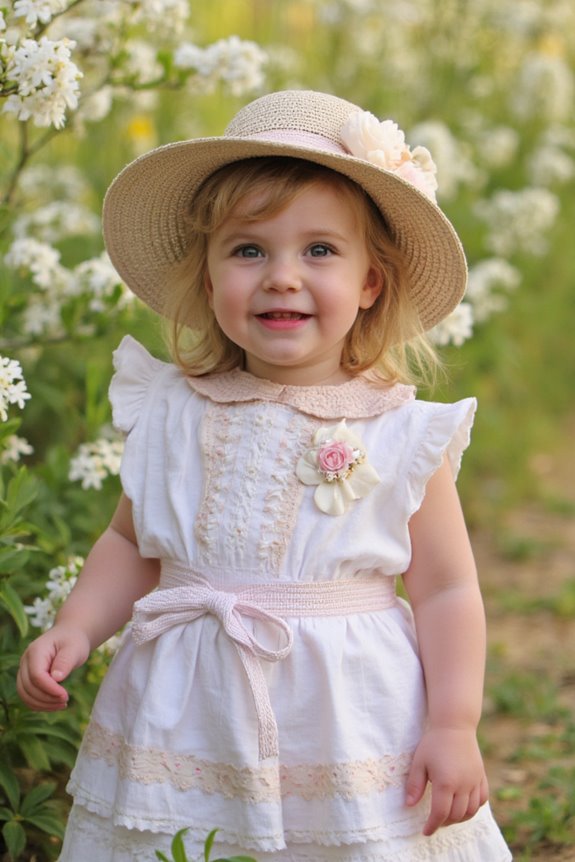
Imogen, a name rooted in literary tradition and classical mythology, exemplifies Victorian-era fascination with romantic, poetic, and historically resonant names.
Its historical significance lies in Shakespearean origins, symbolizing virtue and fidelity.
In modern culture, Imogen maintains elegance through its literary associations, reflecting Victorian ideals of refinement and timeless appeal, thereby bridging historical resonance with contemporary appreciation.
Isabella
Isabella, a name imbued with regal elegance and romantic allure, exemplifies the Victorian era’s admiration for melodious and historically significant nomenclature.
Its historical significance stems from royal associations and romantic literature, influencing popularity trends.
During the Victorian period, Isabella’s refined sound and cultural resonance maintained consistent appeal, reflecting societal values of aristocratic heritage and timeless femininity.
Josephine
Josephine, a name resonant with regal dignity and historical significance, exemplifies the Victorian era’s fascination with aristocratic and literary ideals.
Josephine’s literary significance emerges through its association with prominent figures, while her historical influences stem from Napoléon’s Empress Josephine, shaping Victorian perceptions of elegance and power.
This name reflects a blend of cultural reverence and aristocratic aspiration.
Julia
The name Julia, rooted in classical antiquity, exemplifies Victorian society’s admiration for Roman heritage and the virtues associated with the Julian family.
Victorian fashion influences popularized elegant, Roman-inspired styles, mirroring Julia’s literary significance as a symbol of grace and intellect.
This name encapsulates cultural reverence, blending classical ideals with Victorian aesthetic and literary appreciation.
Lillian
Lillian, a name evoking both floral elegance and Victorian sensibilities, reflects the era’s fascination with natural beauty and refined femininity.
Its flower symbolism signifies purity and innocence, while its historical significance highlights its popularity among Victorian families.
This name embodies the era’s reverence for nature and societal ideals, making it a timeless choice rooted in cultural symbolism.
Louisa
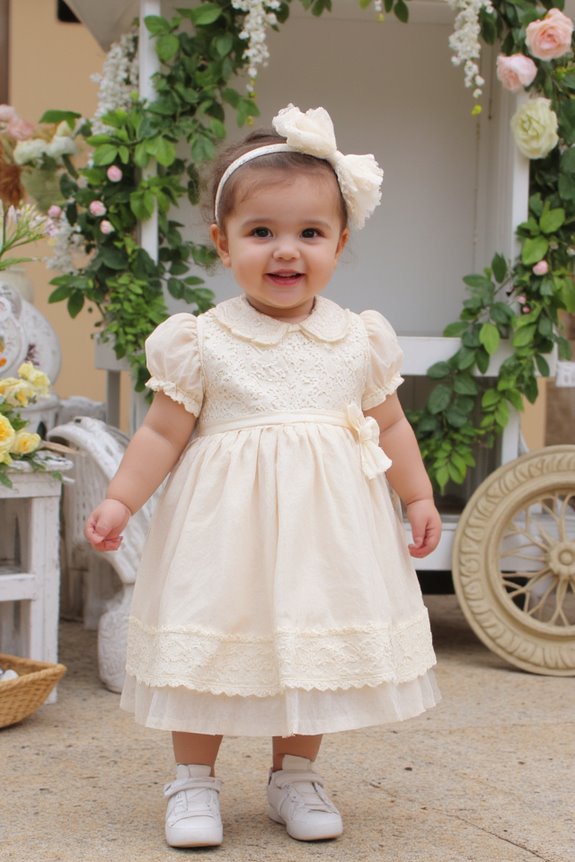
Louisa, a name that gained prominence during the Victorian era, encapsulates both literary elegance and societal aspiration.
Inspired by Louisa May Alcott, whose works exemplify moral strength, Louisa in Literature often reflects intellectual refinement.
Its enduring appeal lies in its literary associations and connotations of compassion, making it a distinguished choice for Victorian-era girls.
Margaret
Margaret, a name rooted in biblical tradition and noble heritage, exemplifies strength and reverence that resonated during the Victorian era.
Its association with figures like Margaret Thatcher’s legacy highlights resilience and leadership.
Additionally, Margaret Atwood’s influence underscores the name’s literary significance, reinforcing its enduring appeal as a symbol of intellectual rigor and societal impact.
Matilda
The name Matilda emerges from a rich historical tapestry that complements the noble and resilient qualities associated with Margaret.
Victorian literature influences, particularly through the portrayal of strong female characters, amplify Matilda’s historical significance.
This name symbolizes intellectual strength and independence, reflecting societal shifts of the era and reinforcing its enduring legacy within Victorian cultural and literary contexts.
Millicent
Millicent, a name that gained prominence during the Victorian era, embodies qualities of perseverance and refinement that mirror societal values of resilience and elegance.
Its historical significance lies in its association with noble virtues, while popularity trends reveal a decline post-19th century, reflecting shifting tastes.
This timeless name underscores Victorian ideals of strength and sophistication.
Nora
Nora, a name with roots in both the Victorian era and Scandinavian traditions, embodies simplicity and resilience that resonated with societal ideals of strength and independence.
Nora’s cultural significance lies in its association with empowerment and virtue, while Nora in literature, particularly Ibsen’s “A Doll’s House,” underscores themes of autonomy and moral complexity, enhancing its historical prominence.
Olive
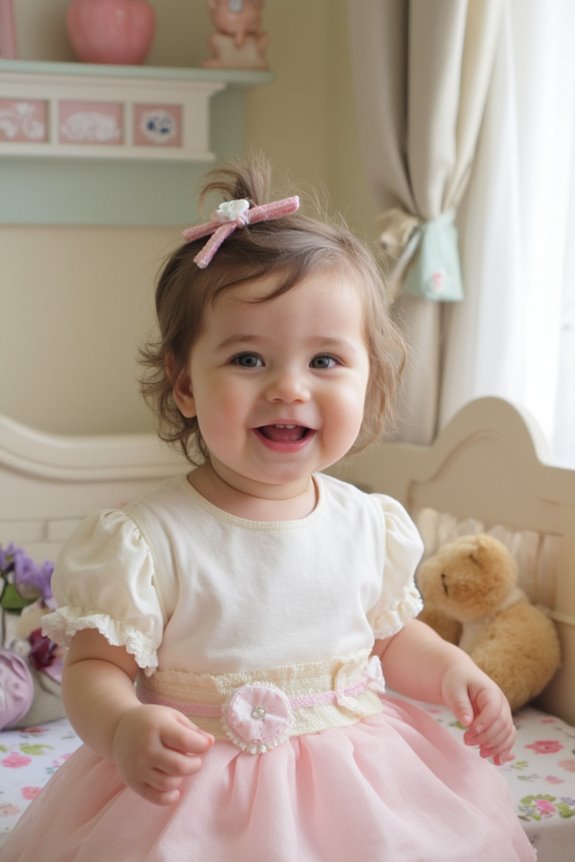
Olive, a name rooted in peace and fertility symbolism, gained Victorian popularity amid fashion trends emphasizing natural motifs.
The historical significance of olives and their trees in literature underscores resilience and moral virtue.
Additionally, the benefits of olive oil, celebrated in Victorian health practices, reinforce the name’s association with nourishment and enduring strength.
Penelope
Penelope, a name embodying fidelity and patience, gained renewed prominence in Victorian times through its classical roots and literary associations.
Its popularity aligns with Victorian fashion trends favoring romantic and intricate styles.
Penelope in literature, particularly in Homer’s Odyssey, reflects resilience, resonating with Victorian ideals of virtue and endurance in a society valuing moral fortitude.
Phoebe
The name Phoebe, rooted in Greek origins, embodies celestial brightness and intellectual insight, aligning with Victorian ideals of virtue.
In literature, Phoebe appears as a thoughtful, spirited character, reinforcing its association with wisdom and enlightenment.
Its classical mythology background and literary presence underscore its enduring appeal as a refined, meaningful Victorian girl’s name.
Rosalind
Rosalind, a name imbued with literary and poetic significance, exemplifies Victorian ideals of intelligence, wit, and moral integrity.
Influenced by Victorian literature, Rosalind’s cultural significance reflects the period’s admiration for strong, moral female characters. Its association with Shakespeare’s “As You Like It” underscores its enduring poetic and cultural resonance, reinforcing its status among Victorian girl names.
Rose
The name Rose carries a rich symbolic and aesthetic resonance that aligns with the Victorian era’s preference for natural beauty and moral virtue.
Rose symbolism reflects innocence, love, and purity, while various rose varieties—such as the damask or tea rose—convey nuanced sentiments.
This name’s historical depth underscores its enduring appeal within Victorian naming traditions.
Ruby
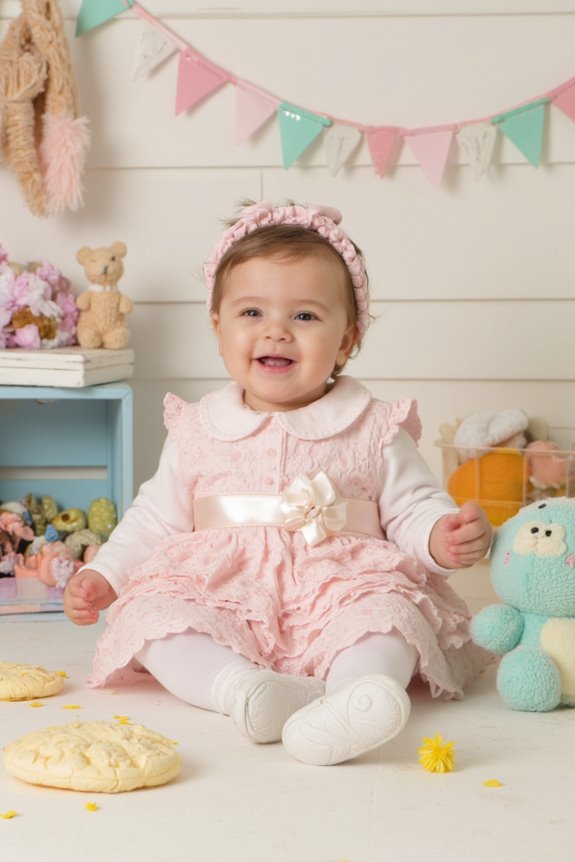
Ruby, a gemstone synonymous with vigor and passion, was a popular choice among Victorian parents seeking names that embodied strength and nobility.
Its symbolism reflects liveliness and protection, while the ruby jewelry history highlights its status as a treasured adornment.
This rich cultural significance made “Ruby” an evocative name representing power and enduring beauty.
Seraphina
Seraphina emerges as a name that encapsulates divine grace and celestial purity, qualities highly esteemed during the Victorian era.
Its historical significance lies in its association with angelic beings, symbolizing virtue and spirituality.
In modern culture, Seraphina maintains elegance through its literary and artistic references, reflecting timeless appeal rooted in both religious symbolism and contemporary sophistication.
Sylvia
Sylvia, a name rooted in classical mythology and literary tradition, embodies a nuanced blend of natural beauty and intellectual sophistication characteristic of Victorian naming conventions.
Sylvia’s literary significance, especially through works like Shakespeare’s “The Two Gentlemen of Verona,” elevated its cultural stature.
In Victorian culture, Sylvia symbolized poetic elegance and refined sensibility, making it a distinguished choice.
Tabitha
Tabitha, a name with origins rooted in biblical tradition and medieval folklore, exemplifies the Victorian era’s appreciation for names with both spiritual significance and historical depth.
Its historical significance lies in its biblical association with Acts 9:36-42.
In popular culture, Tabitha appears in literature and media, reflecting enduring relevance and societal admiration for its timeless, meaningful qualities.
Vera
Vera, a name that conveys truth and sincerity, embodies the Victorian era’s admiration for names with moral integrity and timeless elegance.
Vera’s historical significance lies in its association with virtue and resilience, making it a respected choice.
Today, Vera as a modern name choice reflects its enduring appeal, blending classic charm with contemporary simplicity.
Victoria
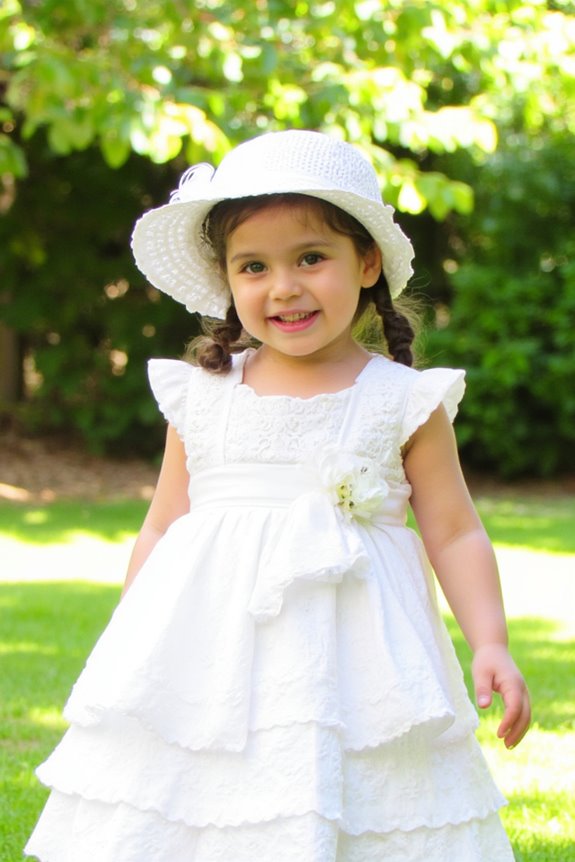
Victoria embodies the regal grandeur and political significance that characterized the Victorian era, serving as both a tribute to Queen Victoria and a symbol of national identity.
Its popularity reflects Victorian fashion trends emphasizing elegance and modesty, while Victorian literature influences highlight a cultural affinity for virtue and resilience, making Victoria a historically rich, meaningful name.
Violet
The name Violet, with its delicate floral imagery, encapsulates the Victorian era’s fascination with nature and symbolism.
Victorian flower symbolism associates violets with modesty and humility, aligning with popular Victorian garden designs emphasizing subtle elegance.
This name reflects cultural values, illustrating how botanical motifs inspired personal names and garden aesthetics during the period.
Winifred
Winifred, a name rooted in Welsh tradition, gained popularity during the Victorian era as a symbol of purity and spiritual strength.
Its historical significance lies in its association with Saint Winifred, emphasizing religious devotion.
Winifred’s popularity trends show a decline post-Victorian but remain valued for their classic, meaningful resonance, reflecting societal ideals of virtue.
Willa
Willa, a name of Germanic origin meaning “resolute protector,” emerged as a distinctive choice during the Victorian era, reflecting a growing appreciation for shorter, nature-inspired names.
Willa’s literary significance stems from prominent authors like Willa Cather, while its historical roots trace to medieval times, emphasizing resilience and strength, making it an enduring, meaningful selection.
Zara
Zara, a name with roots spanning multiple cultures, gained popularity during the Victorian era for its elegant brevity and exotic appeal.
Its meaning significance varies, often linked to “princessor “radiance,depending on cultural origins.
Zara’s diverse cultural origins, including Arabic and Hebrew, contribute to its timeless allure, making it a distinctive choice with rich historical resonance.
Beatrix
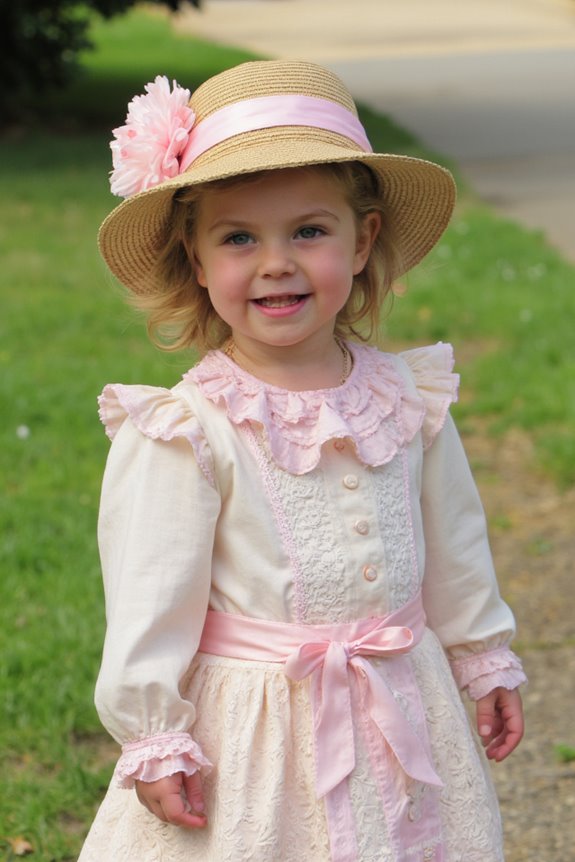
Beatrix, a name of Latin origin, embodies both regal elegance and literary significance, making it a compelling choice in Victorian-era naming traditions.
Beatrix’s literary connections, particularly through authors like Beatrix Potter, underscore its cultural resonance.
Its historical significance lies in its association with figures symbolizing creativity and nobility, reflecting Victorian ideals of refinement and intellect.
Clementine
Clementine, a name of Latin origin meaning “mild” or “merciful,” exemplifies Victorian ideals of gentle refinement and moral virtue.
Its symbolism reflects qualities of kindness and compassion, while its historical significance highlights its association with virtue and innocence.
This name’s enduring appeal stems from its rich connotations, embodying the era’s emphasis on moral integrity and delicate elegance.
Eugenie
Eugenie, a name rooted in Greek origins meaning “well-born” or “noble,” encapsulates Victorian ideals of aristocratic virtue and refined lineage.
Its historical significance reflects the prominence of European aristocracy, often associated with royalty or nobility.
The Eugenie name origin emphasizes status and virtue, making it a distinguished choice embodying the era’s admiration for aristocratic qualities.
Felicity
Felicity, a name embodying the very essence of happiness and good fortune, reflects Victorian society’s admiration for virtues associated with joy and prosperity.
Felicity’s historical significance lies in its association with hope and positivity, while in modern culture, it symbolizes enduring optimism.
Its timeless appeal highlights society’s ongoing valuation of happiness and virtuous qualities.
